M2T to OGGConvert M2T to OGG, M2T to OGG Converter |
 |
| Home | Getting Started | Download | Buy Now! | Screen Shots | FAQ | Support | Contact |
OGG Video Converter converts M2T files to OGG format easily and quickly. The software is an ALL-IN-ONE audio converter that supports more than 100 audio and video files. OGG Video Converter supports batch conversion, and is full compatible with 32-bit and 64-bit Vista and Windows 7.
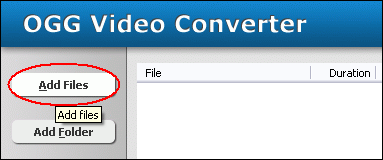 Click "Add Files" to choose M2T files and add to conversion list. 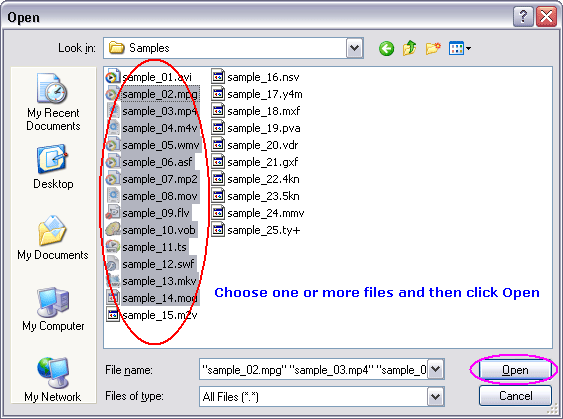 Choose one or more M2T files you want to convert and then click "Open". OGG Video Converter will open the files and get information such as width, height, frame rate, video bit rate, audio sample rate, audio bit rate, audio channels, and then list the information at conversion list. 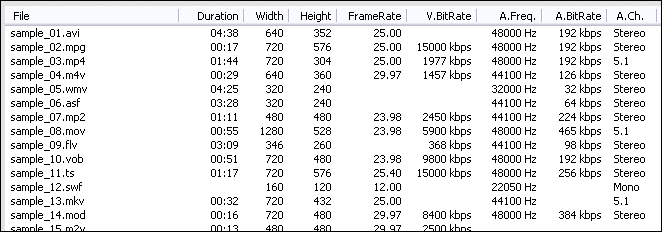
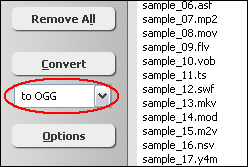
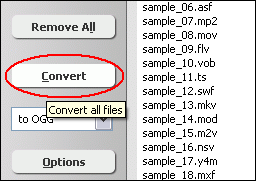 Click "Convert" to convert M2T files to OGG format.  The software is converting M2T files to OGG format. 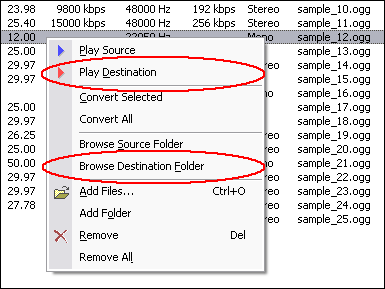 Right-click converted WMA file and choose "Play Destination" to play the outputted WMA file; choose "Browse Destination Folder" to open Windows Explorer to browse the WMA file. What is M2T? Conceived as an affordable high definition format for digital camcorders, HDV quickly caught on with many amateur and professional videographers due to its low cost, portability and image quality acceptable for many professional productions. HDV video and audio are encoded in digital form, using lossy compression. Video is encoded with the MPEG-2 codec at a rate of either 19 or 25 Mbit/s (depending on the frame-size), using 8-bit chroma and luma samples with 4:2:0 chroma subsampling. Stereo audio is encoded with the MPEG-1 Layer 2 codec, at 384 kbit/s. The compressed audio and video are multiplexed into a MPEG transport stream, which is typically captured onto magnetic tape, but which can also be stored in a computer file. Because the primary recording media ¡ª tape ¡ª is transported with constant linear speed, the rate control for both the audio and video compression are locked to a constant bitrate. At the bitrates and frame-sizes (1280x720, 1440x1080) at which HDV operates, the video compression may introduce visible artifacts artifacts, such as blockiness, blurring, ringing. Artifacts are most visible in playback of scenes with lots of fine detail, rapid movement or other complex activity like flashing lights. These scenes would demand the bitrate to exceed the fixed 25Mbit/sec that HDV allocates for the video bitstream, and hence, suffer visible degradation. In contrast to the video, HDV audio bitrate is comparatively generous. At the coded bitrate of 384kbit/s, MPEG-1 Layer 2 audio is regarded as perceptually lossless. What is OGG? The name "Ogg" refers to the file format which can multiplex a number of separate independent free and open source codecs for audio, video, text (such as subtitles), and metadata. In the Ogg multimedia framework, Theora provides a lossy video layer, while the music-oriented Vorbis codec most commonly acts as the audio layer. The human speech compression codec Speex, lossless audio compression codec FLAC, and OggPCM may also act as audio layers. The term "Ogg" is commonly used to refer to audio file format Ogg Vorbis, that is, Vorbis-encoded audio in the Ogg container. Previously, the .ogg file extension was used for any content distributed within Ogg, but as of 2007, the Xiph.Org Foundation requests that .ogg be used only for Vorbis due to backward compatibility concerns. The Xiph.Org Foundation decided to create a new set of file extensions and media types to describe different types of content such as .oga for audio only files, .ogv for video with or without sound (including Theora), and .ogx for applications. Because the format is free, and its reference implementation is non-copylefted, Ogg's various codecs have been incorporated into a number of different free and proprietary media players, both commercial and non-commercial, as well as portable media players and GPS receivers from different manufacturers. Convert M2T to OGG Related Topics: FLV to OGG, VID to OGG, F4V to OGG, OGA to OGG, NSV to OGG, AMV to OGG, ALAW to OGG, GSM to OGG, NUV to OGG, 3GP to OGG, MP1 to OGG, M2A to OGG, MPP to OGG, DIVX to OGG, 3GPP to OGG, STR to OGG, MTV to OGG, XA to OGG, MKA to OGG, MTS to OGG, VOC to OGG, RPL to OGG, 3GP2 to OGG, EAC3 to OGG, VFW to OGG, AVI to OGG, SDP to OGG, MOV to OGG, FLIC to OGG, M2TS to OGG
|
| Home | Getting Started | Download | Buy Now! | Screen Shots | FAQ | Support | Contact | Links |
| Copyright © 2007-2014 Hoo Technologies All rights reserved. Privacy Policy |